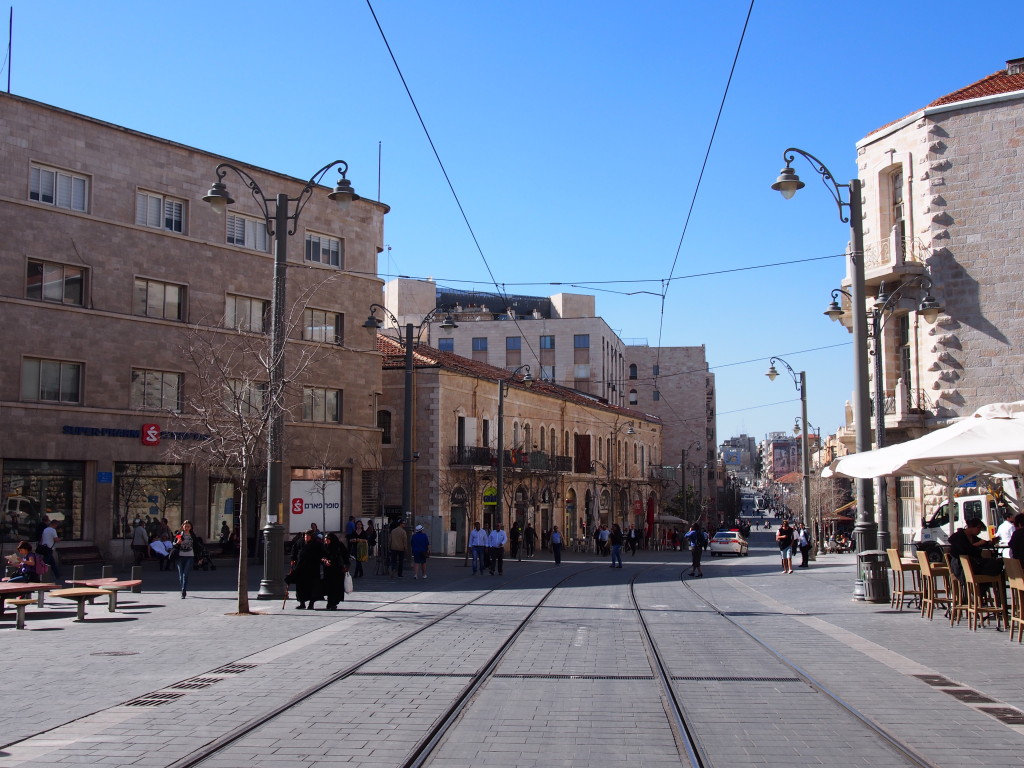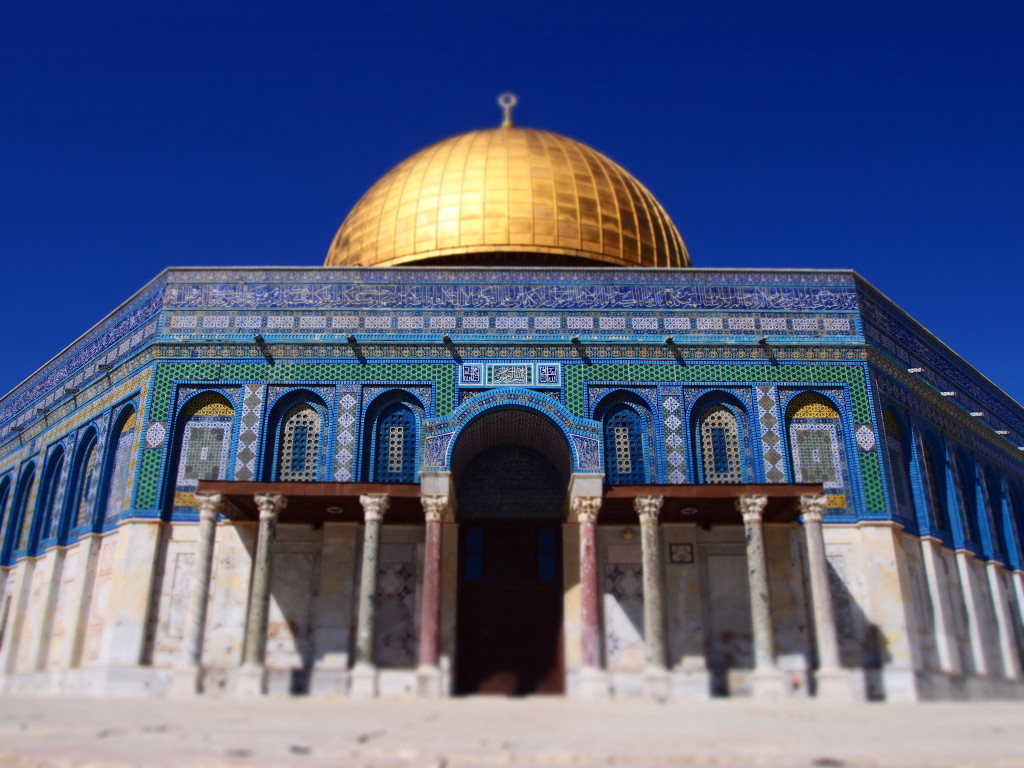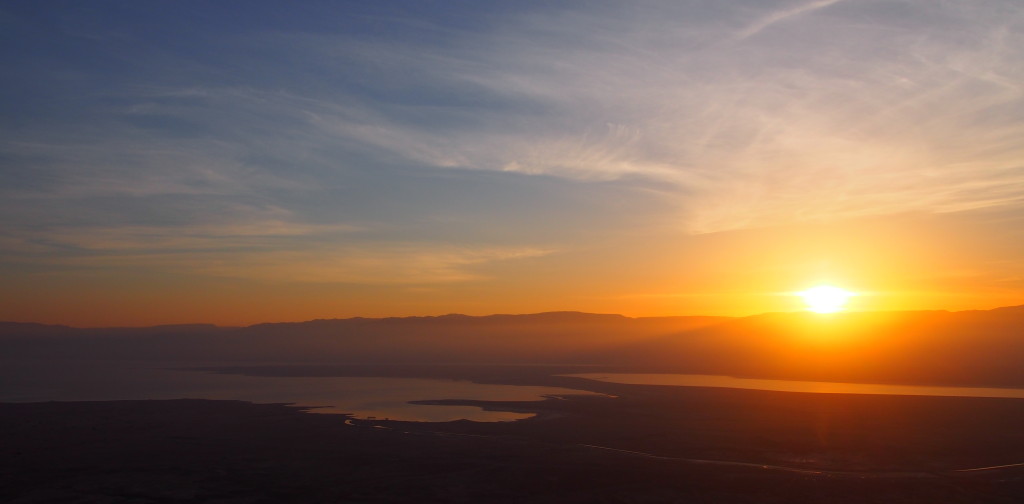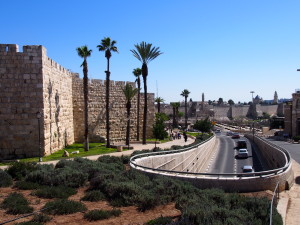 Jerusalem is definitely my favourite city in Israel. It is clean, modern, the people are friendly, the architecture – both old and new – is fascinating and it has a positive vibe. It has a smaller town feel than Tel Aviv, but is actually the biggest city in Israel with an approximate population of 800,000.
Jerusalem is definitely my favourite city in Israel. It is clean, modern, the people are friendly, the architecture – both old and new – is fascinating and it has a positive vibe. It has a smaller town feel than Tel Aviv, but is actually the biggest city in Israel with an approximate population of 800,000.
The city is a very holy place for a number of religions. While the people appear to get along, not all of them are happy with this and in some areas you can feel the undertones of tension, anger and intolerance. Attacks or attack attempts of various forms happen almost daily according to one of the taxi drivers I spoke to. But they are usually handled swiftly and to the tourists, invisibly.
Jerusalem, the new city
The newer parts of Jerusalem are all quite modern, very square shaped buildings all of a creamy sandstone colour. There are loads of shops, restaurants and cafes. The Mehane Yehuda market is a lively, colourful place to visit during the day or night.
The best way to explore Jerusalem is to wander up and down Jaffa Street, then branch off and get lost in the side streets.
Yemin Moshe
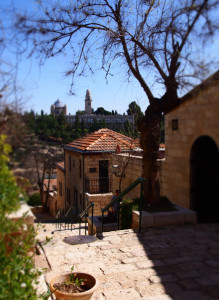 A suburb or area within the newer part of Jerusalem is Yemin Moshe. It was the first settled area outside of the old city walls, it was established by the Montefiore Welfare Fund. It was created as a solution to overcrowding in the old city, but it took a long time to become populated.
A suburb or area within the newer part of Jerusalem is Yemin Moshe. It was the first settled area outside of the old city walls, it was established by the Montefiore Welfare Fund. It was created as a solution to overcrowding in the old city, but it took a long time to become populated.
These days it is a super cute, foot traffic only, area to walk through. Towards the end of it on the uphill side is a windmill. The windmill was built to allow the poor jews to be able to grind their own flour
If you head down the hill there is a really nice park with a fountain. An awesome spot to sit and relax in the sunshine.
The Old City
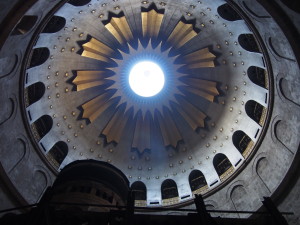
Any reference to the Old City of Jerusalem, is a reference to the walled city of Jerusalem into which you can enter from any one of seven gates. The old city is split into ‘quarters’ or regions; the most significant religiously is the Temple Mount area which has highly restricted access and is only open a few hours of every day. The other areas are the Muslim, Jewish, Christian and Armenian quarters. These areas are full of fabulous old architecture, and old cobblestone laneways in which you can easily get wonderfully lost.
Rather than wander the city and not know the significance of anything, I did a paid, 90NIS, four hour Holy City walking tour. The tour guide Emmanuel was absolutely brilliant. He shared an objective view of all the sights, while explaining their historical and religious significance . The tour included sights such as the Room of the Last Supper; the Tomb of King David; the Church of Dormition where Mary died; Mount Zion and Zion’s Gate; the path of Jesus from where he was given the crucifix to carry along where he fell, where he said goodbye to his mother to where he was crucified; the tomb of Jesus in the Church of the Holy Sepulchre; the Western Wall; and the Temple Mount.
The Temple Mount area is quite fascinating as it is so tightly regulated in terms of hours as well as who may enter. It is only open for a couple of hours in the morning and only one hour in the middle of the day. The Jews are not allowed to enter. The Temple Mount is an area, within which is the Dome of the Rock. This is essentially a shrine over the top of the Foundation Stone, more typically referred to as the Holy of Holies. It is believed to be the most sacred spot on the earth. Jewish history says this is where the Ark of the Covenant containing the Ten Commandments was kept in a temple.
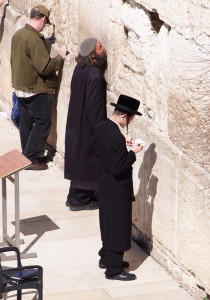 On the West side of the Temple Mount is the original Western Wall of the temple built by Herod. This is the closest public place that Jewish people can get to the Holy of Holies, and this is where they go to pray and talk to God. I have often heard it referred to as the Wailing Wall, but it is actually called the Western Wall. It’s fascinating do a tour in the Western Wall tunnels for 30NIS. In the tunnels is the closest you can get to the Holy of Holies.
On the West side of the Temple Mount is the original Western Wall of the temple built by Herod. This is the closest public place that Jewish people can get to the Holy of Holies, and this is where they go to pray and talk to God. I have often heard it referred to as the Wailing Wall, but it is actually called the Western Wall. It’s fascinating do a tour in the Western Wall tunnels for 30NIS. In the tunnels is the closest you can get to the Holy of Holies.
On a Friday from sunset onwards until sunset on a Saturday, the Western Wall is particularly busy with Jews celebrating Shabbat. People will gather to sing, dance and pray.
Day trip to Masada, En Gedi & the Dead Sea
In order to see Masada and En Gedi I booked a day trip with Tourist Israel for US$69 (departing from Tel Aviv it costs US$79). The pickup was very early in the morning and we returned early afternoon.
Masada
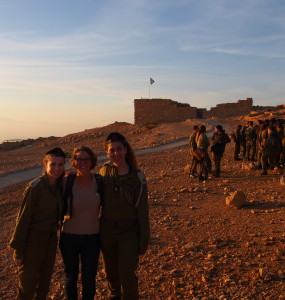 Masada was built by King Herod as a fortress. It was the last bastion of Jewish freedom fighters against the Romans. It is a plateau at the top of a mountain, overlooking the Dead Sea.
Masada was built by King Herod as a fortress. It was the last bastion of Jewish freedom fighters against the Romans. It is a plateau at the top of a mountain, overlooking the Dead Sea.
I did a sunrise hike up the Snake Path to the top of Masada. The tour bus arrived a little late so we had to rush as fast as we could to get to the summit. While we got there in full light, we did get to see the sun crest over the horizon.
In addition to the historical significance of Masada, it is the place where the Israeli military swear their oath of allegiance and hold other important graduation type ceremonies. While up Masada one such ceremony was taking place. There were a hundred or more soldiers receiving awards, clapping for their friends, chatting, taking pictures and singing the National Anthem. Conscription into the military is still a requirement for all Jewish Israelis. Men are required to serve for three years and women for two, I feel that this encourages views of equality between men and women and also forces young people to mature before choosing a career path. While I am not a huge fan of conscription, it seems to work well for Israel.
En Gedi
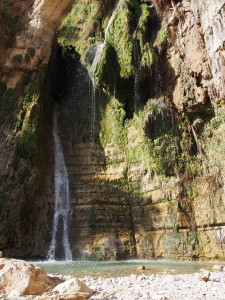 En Gedi is a nature reserve, with beautiful scenery. It is a great spot for hiking and swimming in the springs, though I must say that compared to the nature reserves back home I found it a little underwhelming.
En Gedi is a nature reserve, with beautiful scenery. It is a great spot for hiking and swimming in the springs, though I must say that compared to the nature reserves back home I found it a little underwhelming.
With limited time we walked up the valley along the river, lots of little waterfalls up to the larger falls David’s Falls. Along the way we saw some random oversized rat type creature which I later learned to be the Hyrax.
Dead Sea
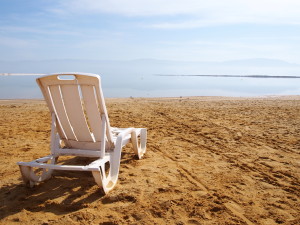 Between the sites of En Gedi and Masada, we stopped at a resort to use their change rooms and showers in order to take a ‘dip’, read as ‘float’, in the Dead Sea.
Between the sites of En Gedi and Masada, we stopped at a resort to use their change rooms and showers in order to take a ‘dip’, read as ‘float’, in the Dead Sea.
Having already done it once I knew what to expect, and it was honestly just as fun the second time around. Body mud mask and all!
The Nitty Gritty
Transport
I travelled to Jerusalem from Tel Aviv twice, I caught the bus both times. Buses depart every 20 minutes or so, no matter what station you leave from. The ride takes approximately an hour and costs 16NIS. You buy the ticket on the bus.
The 605 Jerusalem Express departs regularly from the Super-Pharm Tel Aviv Central Bus Station.
The 480 departs regularly from the bus station on Arlozorov Street, just near the Tel Aviv Center – Savidor train station.
From the central bus station in Jerusalem to my hostel was approximately 25minutes walking or about 5 minutes on the tram. The tram runs along Jaffa Street and a single ride costs 5.90NIS.
Getting around Jerusalem was easy, as everything is walking distance. The only time I caught a taxi was after watching sunset on Mount Olive, it cost me 25NIS to go from the top of Mount Olive to the New Gate in the Old City.
Accommodation
In Jerusalem I stayed at The Post Hostel for six nights in a 4-bed female dorm. It was quite pricey at around 150NIS per night.
The hostel itself was really clean and modern. It had a real urban feel to it. I was highly impressed with the facilities, including USB charging ports by each bed and by the bar. The breakfast every day was absolutely brilliant and the staff were incredibly helpful.
The location was absolutely brilliant and it was only a 5-10 minute walk to the Jaffa Gate entrance to the Old City.
The only thing that was a little disappointing, was that a towel is not included in the price and if you would like one it costs 20NIS. Overall, it was worth the expense.

